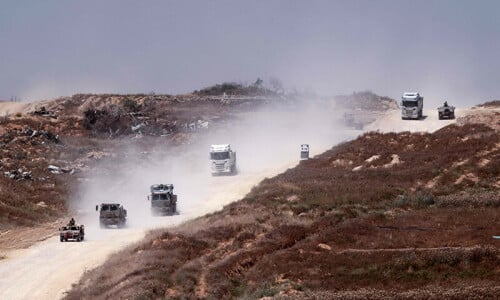GAZA STRIP: Israeli airplanes launched a heavy assault on the northern Gaza Strip for a second day on Wednesday, upending weeks of relative calm. Israel also said that it was proceeding with preparations for a full-scale attack on Rafah in the south.
Following the US Congress’ approval of $13 billion in military aid for Tel Aviv, the attacks resumed.
In a post on social media site X, Israeli Foreign Minister Israel Katz said that the Senate’s adoption of the aid package that the House of Representatives had already approved sent a “strong message to all our enemies”.
A spokesman for Prime Minister Benjamin Netanyahu’s administration stated that Israel was “moving ahead” with its plans for a ground offensive against Rafah, but provided no date, despite entreaties from Western nations, notably the United States, for it to refrain from invading the city on Gaza’s southern edge.
Israeli Prime Minister Benjamin Netanyahu’s decision to send soldiers into the southern Gazan city of Rafah, where 1.5 million Palestinians are seeking refuge, many in temporary encampments, and Israel’s handling of the war in Gaza have soured US-Israeli relations.
strikes in a single day resulted in 79 Palestinian deaths and 86 injuries.
Israeli airstrikes on Rafah and the main Nuseirat refugee camp were reported early on Wednesday by Gazan hospital and security sources.
Witnesses and an AFP correspondent reportedly reported intense nighttime bombing of numerous northern Gazan localities, while the Israeli military claimed that its planes had “struck over 50 targets” in the preceding day.
No where to go
Those who are displaced and taking refuge in Rafah are debating whether to move again.
The entire group is reportedly moving for the Khan Younis shoreline to the north in an attempt to locate a new location “since Israel sounds more serious in its threats this time,” according to Tamer Al-Burai, who fled Gaza City and is currently residing in Rafah in a cluster of tents with seven houses of extended family.
On the other end of the Gaza Strip, Beit Lahiya experienced intense shelling for a second day on Wednesday. The Israeli military had the day before ordered the evacuation of four districts that were designated as “dangerous combat zones.”
Over 34,000 Palestinians have died in the seven months of the conflict, according to Gaza health officials, and many more are thought to be buried under debris. A large portion of the enclave has been destroyed by the offensive, forcing the majority of its 2.3 million residents to flee and causing a humanitarian crisis.
According to the Gaza Health Ministry, Israeli attacks have resulted in at least 79 Palestinian deaths and 86 injuries during the last 24 hours.
Some of the most intense bombardment since the early weeks of the war was reported by northern residents, many of whom had begun to return to houses abandoned during the conflict’s initial phase.
“We’re not sure why any of this is occurring. Is it because the Israelis were offended when we went back home and received aid at last after going hungry for months? stated 29-year-old Gaza City resident Mohammad Jamal, who lives close to Zeitoun, one of the city’s oldest suburbs.
“It seems like the conflict has reopened.” They set the place on fire, as if it were a random occurrence,” he said to Reuters over a messaging app.
Head of the Hamas government media office Ismail al-Thawabta declared that an invasion would be a “crime” and that Khan Yunis and central Gaza “cannot accommodate the numbers of displaced people in Rafah.”
Three individuals had died and several more had been injured, according to medics, following an Israeli airstrike on a gathering in the central Gaza City neighborhood of Nasser Street. According to her husband, Palestinian journalist Amena Hmaid and one of her children perished in an Israeli airstrike on the Beach refugee camp in Gaza City.








